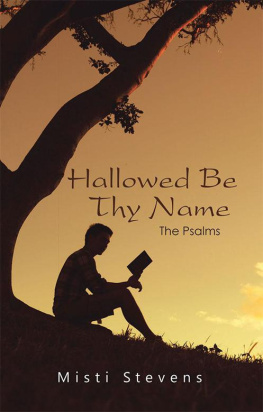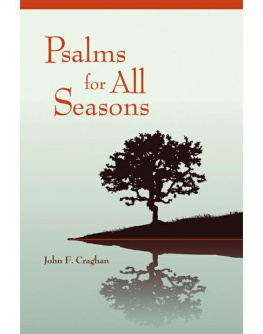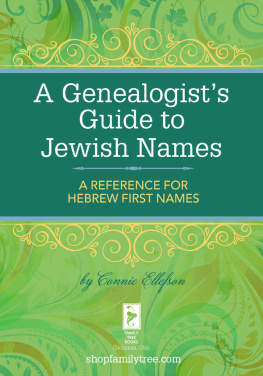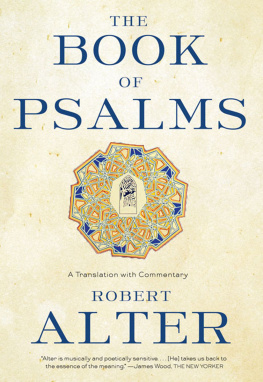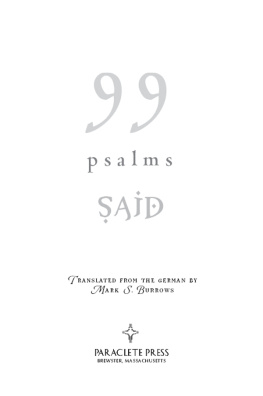Misti Stevens
Hallowed Be Thy Name:
The Psalms

Copyright 2017 Misti Stevens.
All rights reserved. No part of this book may be used or reproduced by any means, graphic, electronic, or mechanical, including photocopying, recording, taping or by any information storage retrieval system without the written permission of the author except in the case of brief quotations embodied in critical articles and reviews.
WestBow Press
A Division of Thomas Nelson & Zondervan
1663 Liberty Drive
Bloomington, IN 47403
www.westbowpress.com
1 (866) 928-1240
Because of the dynamic nature of the Internet, any web addresses or links contained in this book may have changed since publication and may no longer be valid. The views expressed in this work are solely those of the author and do not necessarily reflect the views of the publisher, and the publisher hereby disclaims any responsibility for them.
Any people depicted in stock imagery provided by Thinkstock are models, and such images are being used for illustrative purposes only.
Certain stock imagery Thinkstock.
Scripture taken from the King James Version of the Bible.
ISBN: 978-1-9736-0005-3 (sc)
ISBN: 978-1-9736-0006-0 (hc)
ISBN: 978-1-9736-0004-6 (e)
Library of Congress Control Number: 2017912524
WestBow Press rev. date: 8/31/2017
Dedication
I am dedicating this book to God, Who in His ultimate kindness has shared with us a way to learn more about Him. I thank my grandfather, Cecil Leach, whose deep reverence for God taught me to honor Him, my father and mother, Ken and Judy Leach, who taught me the importance of following Gods word, and my husband, Wendell Stevens, who showed me how to have a relationship with God.
Authors N otes
Great care has been taken to neither add nor take away anything from Gods word. As you read this book you may have question regarding the formatting. The text is from the King James Version (KJV) of the Bible due to copyright restrictions, which was written in Old English, which is significantly different than modern English. At times, sentences seem fragmented, punctuation disjointed and spelling wrong because I have stayed true to the KJV.
The capitalization rules are also very different in the translation between English and Hebrew. For example Psalm 20:1 states, The Lord hear thee in the day of trouble; the name of the God of Jacob defend thee. The text in bold and italics is translated the God The Mighty One. Note the before the name is lower case because it is grammatically an article in the English language. However, The after the name God is capitalized because it refers to the singular nature of God.
Capitalization has been a challenge writing this book. The first challenge was that the Hebrew language has no distinction in alpha case. That is why the Hebrew words in the footnotes are all in lowercase. However, in the glossary, they all begin with an uppercase letter out of respect to Gods name. The second challenge, had to do with the use of English pronouns which represented God. He, him, thee and thou were all used this way, and at other times to represent a person or people. The pronouns that represent God have been capitalized in the text to the best of my ability.
Finally, I am human and thus imperfect. I have prayed all along the way that God would give me His wisdom to see what and how He would want this text to be. I pray now that we can all use this book to grow closer to Him and that any mistakes I made will not take away from the awesome power of His word.
Contents
Preface
Names are important in our culture. Families take great pains to name their children, often honoring previous relatives or friends who have made a difference in our lives. We even develop nicknames that express a persons character or the relationship we have with friends and family members. Whether we use a name of a hero, like David or Deborah, or it be the meaning of the word in the original language, the etymology, great care is generally used when naming a child.
The names of God are no different, yet the Hebrew words for His names are most often translated God in English. Thus, the reader misses the fervor associated with each name unless they happen to study the Hebrew text. This occurs throughout the Bible and especially in the Psalms where Gods names appear over 1200 times. For example, the phrase God of Jacob is repeatedly used in the Bible. What do we picture when we hear this? Many think of the special relationship God had with the Israelites. Going back to the Hebrew word translated God we discover is elohe which means Mighty One.
In Psalm 20:1 David uses this phrase, The Lord hear thee in the day of trouble; the name of the God of Jacob defend thee. So if we add the Hebrew meaning of the word he is actually using the text reads, The Lord hear thee in the day of trouble; the name of the God Mighty One of Jacob defend thee. Examining the word translated God we learn the depth of respect David is showing the Lord. Understanding the meaning of what he said enables us to fully fathom how much he truly trusted God.
Awhile back I studied and journaled the book, Praying the Names of God by Ann Spangler. The study spurred me to go through the Old Testament and look up the Hebrew words translated God. The result has been a deeper faith and the most intimate relationship I have ever had with God, which prompted me to share the information with anyone who would listen, this book is a result of that journey.
How each of us use Hallowed be Thy Name is a personal choice but it has been written to facilitate a variety of studies that address the questions of who, what, where, and why God is.
The Who. The Psalms are written in text with the meanings italicized so that the underlying traits of God that the writer is appealing to are clearly available. The attempt being, to help us understand why David, Solomon or other writers feel the urgency to petition the throne of God.
The What and Where. Near the beginning of the book there is a chart where the Hebrew names of God are listed, the first use of the word in the Psalms, a short meaning and the number of times each name is used is also denoted in this chart. This was added to help the student who is interested in a using the text as reference material.
The Why. Paul writes in 1 Timothy 3:16 that the word of God is given by inspiration, or God breathed. Since that is the case Gods Spirit chose to use over fifteen Hebrew words to denote God, why? Each word has a meaning and brings us one step closer to seeing, feeling, hearing the majesty of God, the I AM. This book helps us ask the questions that open our understanding of our Mighty God.
The How. Applications include private or public reading of the scriptures to better understand the nature of God to whom the Psalmist is appealing or praising. In individual or group study of the Psalms. In personal or congregational prayer.
First Appearances of Gods Name
Hebrew name translated God | Meaning of the Hebrew Name | First Use of Hebrew Word | Number of Uses in the Ps alms |
Yahweh, YHWH | Sacred and Personal | Psalm 1:6 | |
Adonai or Ad onay | the Lord we are His servants | Psalm 2:4 | |
M elek | the King Couns elor | Psalm 2:6 | |
El ohim | the Perfect Beginner of all | Psalm 3:2 | |
El ohay | The Mighty One referring to Gods relationship with a person |
Next page
